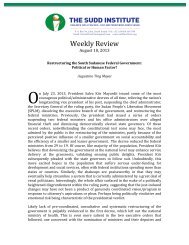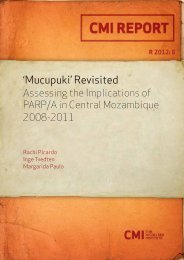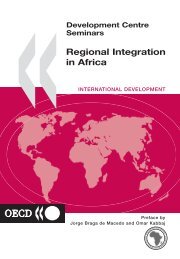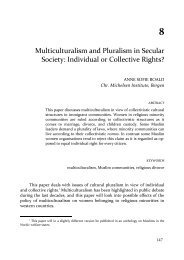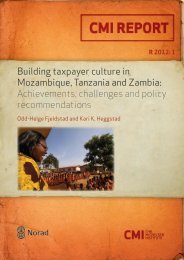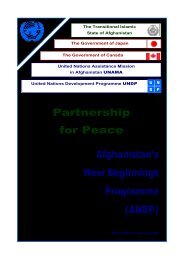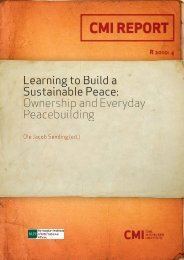Peacebuilding: Lessons for Afghanistan? - CMI
Peacebuilding: Lessons for Afghanistan? - CMI
Peacebuilding: Lessons for Afghanistan? - CMI
Create successful ePaper yourself
Turn your PDF publications into a flip-book with our unique Google optimized e-Paper software.
Build on previous plans <strong>for</strong> rehabilitation and reconstruction in an interim period<br />
Reviewing existing or preliminary assessments <strong>for</strong> rehabilitation and reconstruction,<br />
such as the UNDP 1993 plan, current drafts by the ASG working group and the World<br />
Bank's Approach Paper, should precede the development of new plans. Existing<br />
documents can provide the aid community with approximate figures and priorities<br />
while awaiting representative input from the Afghan transitional authority. The CAP<br />
has identified relief needs that will remain a priority at least until the present Afghan<br />
Interim Authority is scheduled to hand over power. As noted in chapter 2, to elaborate<br />
recovery and reconstruction priorities be<strong>for</strong>e June 2002, when a more representative<br />
authority is scheduled to take over in Kabul, would give disproportionate influence to<br />
the views of the international agencies and donors, and could undermine the rationale<br />
<strong>for</strong> a national transitional structure.<br />
Assess implementation capacity<br />
In general, assessing the implementation capacity of relevant actors is as important as<br />
assessing the needs of the beneficiaries. Assessing and strengthening Afghan<br />
institutions - in both the public and the private spheres - is clearly an integral part of a<br />
broader reconstruction and development process.<br />
30



